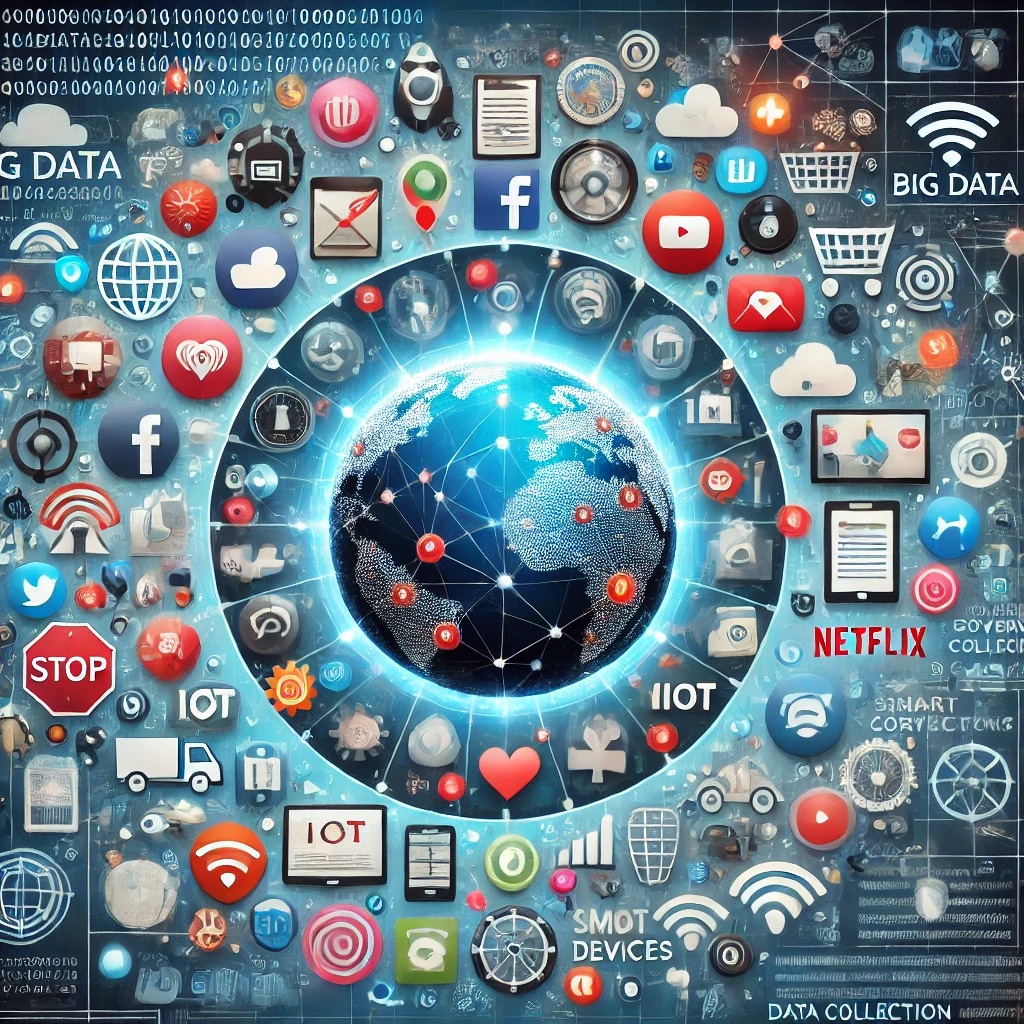Big Data Collection:
Benefits, Risks, and Ethical Concerns
Big Data refers to the massive and complex volumes of data generated every second from diverse sources, so expansive and intricate that traditional data processing systems struggle to manage it efficiently. This data is characterised by its scale, speed of generation, and diversity of formats, ranging from structured logs to unstructured multimedia.
Everyday human activities play a crucial role in generating and collecting big data, often through routine interactions with technology and digital services. Various industries capitalise on this data to drive innovation, enhance user experiences, and optimise decision-making. Below are the key players and categories involved in big data collection:
1. Technology Giants
Tech companies dominate big data collection, leveraging their extensive platforms and user bases:
- Google (Alphabet Inc.): Tracks search history, YouTube activity, Google Maps usage, and more, with tools like Google Analytics enabling widespread data collection.
- Amazon: Monitors shopping patterns, browsing habits, and smart device interactions through products like Alexa.- Microsoft: Collects data via Windows, Office 365, LinkedIn, and Azure cloud services.
- Apple: Gathers data from Siri, Apple Health, the App Store, and its ecosystem of devices.
2. Social Media Platforms
Social media companies analyse vast user-generated content and engagement data:
- Meta (Facebook, Instagram, WhatsApp): Tracks user activity, interactions, and ad preferences across platforms.
- Twitter (X): Monitors tweets, retweets, and user engagement metrics.
- TikTok: Collects video-watching habits, preferences, and behavioural data.
- Snapchat: Tracks user interactions, shared content, and filter engagements.
3. E-Commerce Platforms
Online retailers optimise user experiences using behavioural and transactional data:
- Amazon: Analyses purchase history, preferences, and logistics data.
- Alibaba: Tracks marketplace activities and related services like Alipay.
- eBay: Collects data on buyer-seller interactions and transactional behaviours.
4. Telecommunications Providers
Telecom companies gather communication and usage data for service improvement:
- Examples: Providers collect call logs, SMS data, internet usage, and location data to optimise networks and gain customer insights.
5. Streaming and Content Platforms
Streaming services personalise recommendations using consumption patterns:
- Netflix: Tracks viewing habits and preferences.
- Spotify: Collects listening behaviours and playlist preferences.
- YouTube: Monitors video engagement and user preferences.
6. Healthcare Organisations
Healthcare entities use big data for patient care and medical advancements:
- Electronic Health Records (EHRs): Store patient data and treatment histories.
- Fitbit and Garmin: Gather physical activity and health metrics.
- Pharmaceutical Companies: Use data for research and clinical trials.
7. IoT Providers
IoT devices generate real-time data on user behaviours:
- Nest (Google): Collects data from smart thermostats and security devices.
- Ring (Amazon): Monitors smart doorbell and security camera usage.
- Tesla: Tracks vehicle diagnostics, GPS data, and driving patterns.
8. Cloud Computing Providers
Cloud platforms enable data storage and processing at scale:
- AWS, GCP, and Azure: Offer big data storage, analytics, and AI tools to businesses worldwide.
9. Public Sector and Governments
Governments collect data for governance, security, and infrastructure:
- Census Data: Demographic and economic surveys.
- Surveillance Programs: Collect data for public safety and law enforcement.
10. Financial Institutions
Banks and financial companies analyse transactional data for optimisation:
- Visa, Mastercard: Process extensive transactional data globally.
- JPMorgan Chase, Bank of America**: Use data for fraud detection and product personalisation.
Ethical and Privacy Considerations
While big data offers transformative benefits, it raises concerns about privacy, security, and ethical use. Regulations like GDPR (Europe) and CCPA (California) seek to ensure transparency and protect individual rights.
Conclusion
Big data is deeply integrated into our daily lives, transforming industries by enabling tailored experiences and data-driven insights. However, its pervasive nature necessitates robust governance, ethical practices, and transparent policies to balance innovation with the protection of individual rights.
